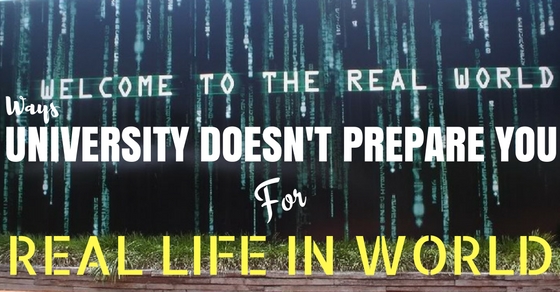“Education is the primary requirement for anyone living in this world.”
It is the first stepping stone towards getting a glimpse of the world around us and prepares oneself for real life ahead.
Schooling system shapes a certain personality of the child into adulthood, colleges and universities are the final steps to enter into the real world.
The lives we all live in schools and colleges are different from the reality that lies ahead of us.
With so many popular colleges around the world, teaching various subjects and specializations, there is not a single university which prepares the student for the real world.

People become doctors, scientists or artists in the colleges, but the essential tools and tricks to survive life never mention in the colleges.
Due to the lack of basic life training, many students get a shock of their life when they move further out of college and start with their jobs. The lack of this transitional phase may lead to various mental and physical health issues.
What They Don’t Teach You in College – 15 Life Skills:
1. Art of communication:
Communication is an essential part of everyone. Be it with friends, acquaintances, bosses or anyone in the outside world.
Learning to impress anyone with their words which one can remember for a long time. Even writing emails for professional purposes is of extreme importance.
Universities do not teach or share any form of knowledge on communication be it verbal or written.
The present generation is born with technology in hand, hence, they are losing out on the importance of communication, and they hardly speak to anyone in the outside world.
Knowing when to speak and when to listen is valuable in professional experience and interpersonal skills.
2. Art of negotiation:
Getting the work done or cracking the right deal is another part of effective communication. Being a Negotiator is highly important especially in the professional world.
Negotiation varies from salaries to business deals or any other form where both the concerned parties are to be benefitted.
Various surveys have proven again and again that negotiating for the right price or product is lacking in most of the people.
Colleges provide the information within the books but negotiation is something where one needs to be smart, patient and know when to say the right words.
To be good at negotiation one needs a lot of practice and experience and a college is the best place to hone this skill before students go into the real world.
3. Finding the right job:
Students enroll in colleges primarily to learn the subject of their choice and to find the right job in the industry. Finding the right job is important as it makes a person self-sufficient and contributing to society and the country.
Students need to prepare for finding the right job, by training them to make an effective resume, preparing them for the interviews.
Colleges may teach the subject well but never prepare the students as to how to get the best job available in the market.
4. Critical thinking:
Once a decision is made, a person needs to go through the consequences; they might be good or bad depending on the action taken.
Therefore, one must think before making any hasty decision. Universities test only the content taught within the classrooms with the specific content provided to the students, they do not encourage them towards critical thinking which is required in the outside world.
Thinking in the right direction is not something one is born with, but it requires guidance and knowledge sharing in an educational space.
Despite getting higher degrees many people tend to make wrong career choices or miss out on the best opportunities due to irrational decisions made.
5. Money management:
Many students in colleges and universities tend to be on a student loan, once out of college students struggle with paying this debt.
Once in jobs, freshers tend to splurge money on unnecessary things which later on result with no savings for an emergency.
Business colleges do teach about finance and account for industrial purposes but the real test is managing money for personal benefits.
Colleges need to add money management as a part of their curriculum structure or as an additional class for students where they can learn all about savings and benefits of savings.
Teaching them the importance of various insurances for short term and long term plan will prepare them for the future ahead.
6. Time management:
The world revolves around time, everything is expected to be done on time.
From exams, project submission, deadlines in jobs, it is almost everywhere. But no one teaches how one should be able to manage time efficiently so that the target is achieved in the designated timeline.
The older one gets, time managing skills become of more importance, managing between job and family with children and personal time, everything depends on how efficiently one can manage the time.
The earlier in life one learns these skills, the sooner the person can cultivate its benefits in life.
7. Teaching about taxes:
Once a person starts working, they require to pay taxes to the government depending on the salary slab they fit in. Various tax saving schemes help the person in saving a lot of money from getting a deduction in the name of tax.
Colleges need to ensure to teach their students about the tax system before they enter the job world, as this is important for them to know as to when and where the money needs to spend and saved.
Regarding the tax method, there is incomplete knowledge of the students; hence, many tend to lose out a good amount of money in the name of tax.
8. Learning about first aid:
Accidents can happen anytime and finding the medical personnel immediately is something that not guarantee.
It is good for a person to learn about basic knowledge on first aid, for example, to give CPR or to understand the correct symptom of the illness.
Knowing how to give a basic treatment of burn, or saving the drowning person helps in saving a life on time. It is important to learn the various signs of illnesses like heat stroke, dehydration, difficulty in breathing and learning about the preliminary precautions that will come in handy.
Universities need to focus on the first aid knowledge to give to students regularly to the point that everyone is aware and knows the steps of protection.
9. Managing without technology:
The world has become so technology-driven that it is difficult to imagine doing things without them.
The current generation is losing out on the importance of doing things without technical assistance, preparing for it for the future is effective.
What if the person lands up in a situation where there is no technical assistance, how one can tackle it? These might be the old ways but are reliable methods to work with.
For example, managing tools can be important when being in the real world.
10. Cooking:
Everyone needs to eat to live healthily and to survive. Cooking is an essential art or way to live in the world. It might not be possible to be dependent on outside food always, in the real world one might land up in a situation where one needs to cook.
Universities never explain the basics of cooking to live outside in the world. Dependency on outside food is not good for health; hence, cooking food by self is a reliable way to live a healthy life.
The benefit of cooking skills helps in saving a lot of money spent on cafes and restaurants. Culinary schools are meant for specialization but learning cooking, in general, is more fruitful to every individual.
11. Etiquette:
In the world outside college, proper behavior as per the place is of high value. One needs to understand how the person supposes to talk to other people no matter what class or social background they have.
Use of right verbal and body language (especially a work) is important, the correct behavior and attitude is the need of the time. Universities tend to miss out on the simple idea of etiquette to be taught to the students.
With the secured walls of the university, the whole attitude and behavior of people are different when compared to the outside world. Simple words like thank you and please are losing their significance today.
In the good old days, etiquette classes were held to teach the young people about the correct behavior and mannerisms with people, but now these classes are becoming things of the past.
12. Protecting self:
The crime rate in the current world is growing rapidly despite the fact the police forces are also becoming strong.
One never knows when they need to protect themselves from the criminals; good knowledge of self-protection will come handy then.
Keeping pepper sprays or a small hidden weapon is a good beginning, but when these things are not accessible then fighting with hands becomes essential. Universities should organize self-defense classes and training for everyone.
Especially for women, learning about self defense should be of priority. Every day one reads about the lives of women being endangered, training them for such times will be really helpful.
13. Managing failure:
The real world filled with successes and failures; in general, people require to be very resilient to achieve success in life.
The education system hardly encourages its students to face real challenges and rise above the failure. Teachers keep on encouraging the students to achieve but sometimes people tend to fail in successive attempts which might lead them to depression.
The positive and achieving environment of a college space hides the brutal truth of failures in the outside world.
A college should ensure to show the real concerns of the industry, where things might not be in favor easily. As there are too many competitors sometimes managing failure is a great thing one should have an idea of.
14. Strength and weaknesses:
Colleges provide a general curriculum for everyone. The students are judged by the same standards, the point to note is that every individual is gifted with different talents and they cannot be judged by the same parameters.
In the race of getting ahead of others, many students miss out on the larger picture. They are not completely aware of their strengths and weaknesses which will be effective in shaping their career paths.
Universities and colleges need to incorporate various personality tests and train the students as per their capabilities.
15. Stress management:
The social pressure to be the best in everything is growing day by day leading to a lot of mental and physical stress.
People want to be the best in their work, in their personal life, and in extracurricular activities. In all these competitions people are forgetting to take care of themselves.
It is becoming difficult for people to accept that one does not have to be the best in everything; this stress is leading to various illnesses at a young age.
It will be effective if universities can organize stress management classes for the students and guide them on tackling with the unnecessary social pressure experienced by them.
Conclusion:
Although even the best colleges claim to impart the best education to their students, they still tend to miss out on the information that needs the most. If the college is not providing and training the students in the necessary steps need to face the real world, then students need to work towards it.
Getting a job or marrying are merely milestones in a person’s life, the important message not to be missed is how to make the most of the life given.
The lack of right information and knowledge many brilliant minds tend to fail because of minor concerns. Now is the time when colleges and universities need to incorporate this essential knowledge into their curriculum and ensure that their students are completely self-sufficient.







































